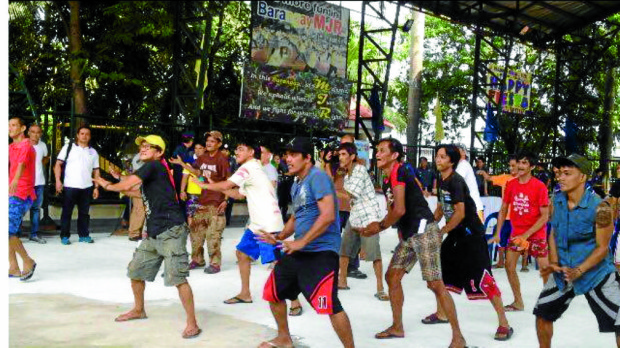
ZUMBA FOR JUNKIES Drug users and pushers in Mandaluyong City, who vowed to mend their ways, will be required to attend Zumba sessions at 7 a.m. every Sunday with the regular Zumba “addicts’’ of the city. RITZCHELLE BELENZO/CONTRIBUTOR
Change is more fun for surrendering drug dependents in Mandaluyong City, who will be required to join other fitness participants in the 7 a.m. Zumba session every Sunday.
On Wednesday, most of the 93 drug pushers and users in Barangay Mabini-J Rizal in Mandaluyong City joined the village’s Zumba session after their surrender to the barangay chair, Angelina Tablan; Eastern Police District chief, Senior Supt. Romulo Sapitula; and the Mandaluyong City police chief, Senior Supt. Joaquin Alva.
“It was fun. I enjoyed it. I have lost hope, but when I danced, I realized there are things that can still be fun,” said Rodolfo Zamora, a drug user since 2008.
“I want to change. I hope this is really the start,” said the 48-year-old construction worker as he joined the session led by the National Capital Region Police (NCRPO) fitness team leader, PO1 Neil Dennis Zuniega.
Lifestyle change
Zuniega said with Zumba and regular exercise, drug dependents would be encouraged to change their lifestyle, eat right and eventually set aside drugs by learning a new and productive hobby.
The toxins inside their body, he added, will be released. “It’s a total lifestyle change and not just abstinence from illegal drugs.”
Tablan, a Zumba fanatic, said the dance fitness sessions “will also force drug dependents to wake up in the morning and be productive.”
Sapitula, who said Zumba would help speed up the recovery of drug dependents by making them perspire more, announced on Wednesday the July 30 deadline for drug users in the Eastern Police District.
“It’s either they end their drug habit, or we’ll end them,” he said.
‘Cage of change’
In Rosario, Cavite province, a “cage of change” has been stirring up several changes in this coastal town.
The prospect of being held in a steel cage measuring 6 x 3 x 1.5 meters, and being displayed and paraded publicly with 15 to 20 other suspected drug pushers, has prompted some 500 to 800 drug users, as of Wednesday, to submit their names to community officials for rehabilitation.
The group, most of them male and some of them minors, heeded the July 9 deadline set by the Rosario local government for them to register for rehab as an intensified crackdown on illegal drugs was in the offing.
Unorthodox
Rosario Vice Mayor Jose Ricafrente Jr. said he thought of the unorthodox way of fighting drugs upon hearing the woes expressed by parents over their children’s drug habit.
“They came to me crying, saying their sons have become uncontrollable,” the official said in a phone interview on Wednesday.
Ricafrente, who ran and won as vice mayor after three terms as Rosario mayor, said he thought of a cage similar to those holding stray dogs that would be drawn by an orange multicab and paraded around town.
“It is not our intention to humiliate anyone, but to serve public interest,” said Ricafrente, a lawyer who said he believed using the “cage of change” did not violate any law.
But Human Rights Commissioner Gwen Pimentel Gana, in a text message, said this method was no different from public shaming.
No due process
“The act strips the person of his or her dignity as a human being… and takes the form of cruel and unusual punishment. Presumption of innocence is set aside as (suspects) are already presumed guilty. There is no due process,” Gana said.
The Commission on Human Rights earlier called the attention of Tanauan officials in Batangas province for its “walk of shame,” which had suspects paraded around the city while wearing placards corresponding to their offense.
But the Rosario police chief, Chief Insp. Mark Joseph Laygo, described “(the idea of a cage) as really having an effect. We are expecting a mass surrender (of drug users).”
The municipal government has allotted P39,000 for each person it would commit to the Central Luzon Drug Rehabilitation Center in Pampanga province for the 10-month rehab program. With a report from Juan Escandor Jr., Inquirer Southern Luzon

